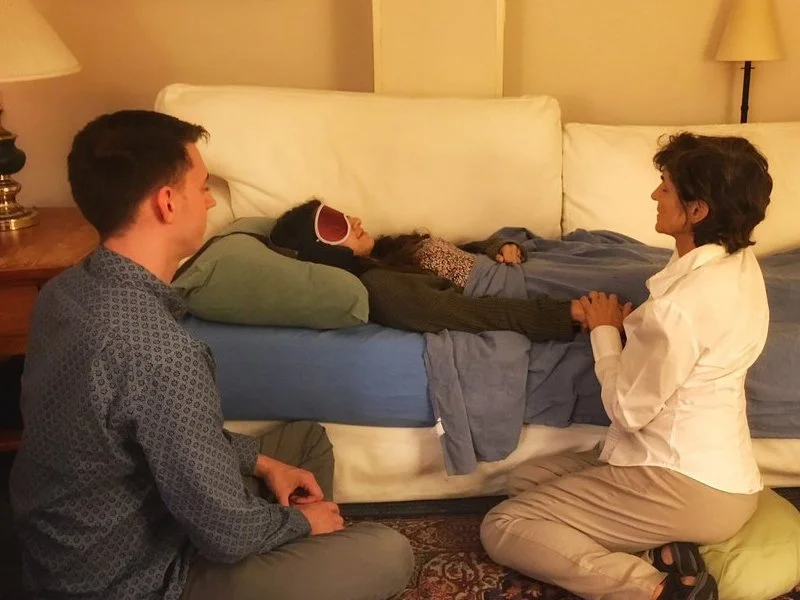Johns Hopkins University's Clinical Research on Psilocybin
Johns Hopkins University is a Leader in Modern Clinical Research in Psilocybin
The field of Psychedelics lies at an intersection of neuroscience, psychology, and pharmacology. Once marginalized, this discipline is now exploring new frontiers in mental health and personal wellness treatment. Through over 150 published studies, the Center for Psychedelic & Consciousness Research at Johns Hopkins University is expanding our understanding of mental health disorders with psychedelics, particularly psilocybin. The Center's groundbreaking research and academic success has profound implications for therapy, policy, and societal well-being.
A Psilocybin Session at Johns Hopkins
A session at Johns Hopkins University follows a protocol in which the clinical trial subject is blindfolded, encouraged to lie still and focus inward. Music, lighting and atmosphere is often prescribed and two therapists are present.
Read more.
Revitalizing Psychedelic Research
Under the leadership of the late Roland Griffiths and now Frederick Barrett, the Center for Psychedelic & Consciousness Research has set its sights on the reintegration of psychedelic substances into mainstream scientific inquiry and mental health treatment. Griffiths, a renowned psychopharmacologist recognized for his work on caffeine addiction, had pivoted his focus to psilocybin in 1999. His reputation and work attained the first FDA-approved study of psychedelics in decades in 2000, and launched the first psilocybin study in 2006. Through his diligent efforts the Center has attracted $55 million in funding from private donors to conduct its research. The Center is committed to advancing our understanding of how psychedelics influence consciousness and cognition.
Navigating Regulatory and Social Landscapes
Despite significant advancements, psychedelic research faces substantial challenges, primarily due to the federal illegality of substances like psilocybin in the United States and most of the world. In the US, its Schedule I classification by the Drug Enforcement Administration (DEA) severely restricts funding opportunities and complicates clinical trial procedures.
The Center’s long term effort would aim to reclassify psilocybin from Schedule I to Schedule IV, recognizing its low potential for abuse and significant medical value. Such a change would not only facilitate additional research but also potentially usher in new therapeutic and recreational applications.
Public perception and the historical stigma surrounding psychedelics also pose barriers. The Center seeks to combat the legacy of skepticism and fear surrounding these substances through robust community engagement and comprehensive education.
Implications of Psychedelic Research
The implications of the Center’s research extend far beyond academic journals and clinical trials. By demonstrating the efficacy of psilocybin in treating various mental health disorders, the Center not only challenged existing treatment paradigms but also offered new hope to individuals for whom traditional therapies and wellness practices have fallen short. Their ongoing studies continue to show promising results for conditions like PTSD, depression, and addiction.
Moreover, they’ve helped to underscore that the potential applications of psychedelics reach into areas not traditionally associated with mental health. Their research has explored the effects of psilocybin on creativity, problem-solving, and general well-being suggesting broader uses for these substance. This research contributed to Oregon adopting an adult-use framework, regulated by the Oregon Health Authority, rather than a strictly medical one. Clients have sought all manners of personal self discovery anywhere enhancements in cognitive capabilities and emotional resilience are important, from improving their mental golf game to their performance at work, to overcoming creative block and regaining flow.
Differences in the Clinical Perspective, Psilocybin Sessions at Lucid Cradle
Stable Pathways Group and Lucid Cradle, regulated and operating legally under Oregon's adult-use model, support’s clients through a variety of needs, whether they are seeking therapeutic support or just seeking new joy in their life. Like John Hopkin’s, we believe psilocybin to aid in mental health and personal development, making these substances accessible for a broader range of purposes. However the requirements to participate in a clinical trial at John Hopkins are numerous and most individuals are excluded. Additionally, the protocol is rather stringent, requiring specific music and restriction of movement.
Lucid Cradle, recognizing that everyone’s reason for seeking psilocybin services is uniquely their own and that everyone’s comfort is paramount, offers a less structured approach. You may choose your own music, move freely about the multiple rooms as you desire, and are in the direct care of Jeanette Small who will help you with your preparation and therapeutic integration. Oregon’s model does have exclusion criteria, such as individual currently taking Lithium, but otherwise anyone is free to seek services. During your free private consultation, Jeanette will help you understand whether these services may be right for you.
Stable Pathways Group, in collaboration with Lucid Cradle, enhances this effort by managing all of the logistics around your transportation, accommodations, cursory wellness services and vacation activities.
We support clients variety of needs, from veterans and first responders dealing with PTSD and anxiety, to musicians seeking creative flow. Our flexibility underscores the diverse potential of psilocybin to aid in both mental health and personal development.
A Psilocybin Session at Lucid Cradle
Lucid Cradle offers clients the opportunity to stay comfortably stationary or move around. While some opt to use a blindfold or prescribed music, many do not. You may engage in the main room, enjoy snacks and refreshments or retire to the bedroom for a more private, inward experience.
See more of the space
Furthering Acceptance
The Center for Psychedelic & Consciousness Research at Johns Hopkins University represents a significant and pioneering approach to mental health treatment. Their rigorous research continues to influence how our society views and approaches mental wellness when it comes to psychedelics. It’s important to remember though, that the methodologies employed by Johns Hopkins are just one of many approaches in the evolving field of psychedelic research, with diverse methodologies continuing to emerge. It’s important to find a modality and support that works best for you—it’s your trip.
Schedule a consultation with us to learn more and see if a personalized psilocybin retreat from Stable Pathways Group is right for you.


